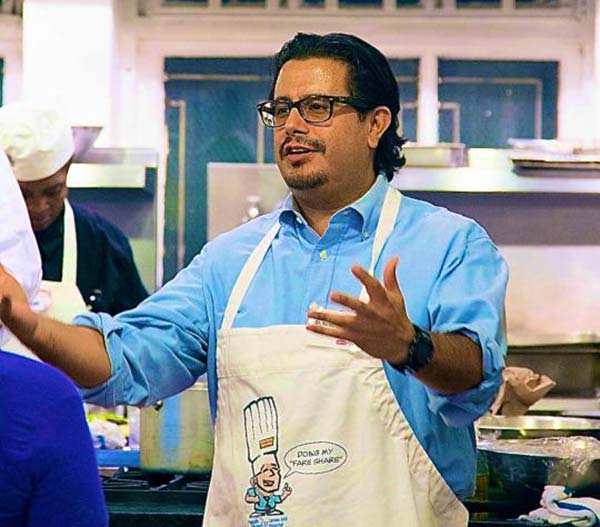How Dr. Robert Graham Is Changing Patients’ Lives, One Cooking Class at a Time
- By Jeff O'Heir - April 28, 2015

Dr. Robert Graham teaches medical residents how to cook nutritious vegetarian dishes for themselves and their patients. Photo: Dr. Robert Graham
The basil, rosemary, dill, and thyme on Lenox Hill Hospital’s rooftop garden in New York recently sprouted. But the seeds Dr. Robert Graham planted are delivering more than just herbs. Gradually, they’re helping to produce healthier patients and, as unbelievable as it may sound, nutritious hospital food that actually tastes good.
Graham, director of resident research at Lenox Hill and the new director of integrative health and wellness for the hospital’s parent organization, North Shore-LIJ Health System, is one of a growing number of doctors and healthcare workers throughout the country emphasizing a diet of whole, plant-based foods to help prevent and treat chronic diseases. As a director at one of New York’s largest health care systems and a frequent speaker at health and food conferences, Graham is helping to shape the nationwide conversation around his favorite theme: food as medicine.
“This whole ‘pill for an ill’ won’t work for these chronic illness,” Graham said, as he walked along the dozens of planters filled with herbs and micro greens that will eventually make their way into the roast chicken, pizza, salads, and side dishes the New York City hospital serves to its employees and patients. “Instead we have to address them through lifestyle choices. That really starts with food. You start with food and you can change everything.”

Before it became the Victory Greens rooftop garden, this is where the Lenox Hill Hospital staff used to come for smoke breaks. They now come to relax and pick fresh herbs. Photo: Dr. Robert Graham
Lenox Hill’s rooftop garden, in its second season, is just one of Graham’s initiatives. He’s working to set up small gardens at North Shore LIJ’s other 18 hospitals, and has plans to eventually establish a local micro-farm that will help supply the system’s kitchens. He gained national media attention for starting an ongoing series of cooking classes that teach medical residents – a group generally known for its bad eating habits and worse cooking skills – how to cook nutritious meals. Late last year he developed a similar class, “Food Is Medicine,” for the system’s veteran doctors.
The residents and doctors, who take the classes at the Natural Gourmet Institute in New York, are expected to pass along the cooking skills and nutritional information they learn with patients who suffer from among the most prevalent and preventable chronic diseases: obesity (almost 40 percent of Americans), diabetes (30 million, 86 million with pre-diabetes), high cholesterol, and hypertension.
Graham’s program is not alone in terms of connection how food impacts the health of the body. There are groundbreaking programs like Tulane School of Medicine’s Goldring Center For Culinary Medicine, the 16,000-square foot green rooftop and gardens at the Chicago Botanic Garden, and the St. Luke’s Rodale Institute organic farm in Eason Pa., which provides produce for the St. Luke’s University Health Network.
Graham’s teaching concept at is based on studies that show doctors who follow a healthy lifestyle are more likely to prescribe healthy lifestyle choices to their patients. Graham modeled the classes on those taught at the annual Healthy Kitchens, Healthy Lives conference, which bridges nutrition, healthcare and culinary arts.
“Patients don’t get satisfaction by taking pills. Patients get satisfaction by seeing real results made through lifestyle changes,” Graham said, referring to integrative medicine’s holistic approach of dealing with illnesses by helping patients maintain a healthy body, mind. and spirit.

Basil and other herbs from Victory Greens make their way into some of the salads, soups and pizzas served to Lenox Hill’s staff and patients. Photo: Dr. Robert Graham
To help spread Graham’s message to the front-line workers who prepare the food for the hospital’s staff and patients, Michael Kiley, director of nutrition and dining services at North Shore University Hospital in Manhasset, N.Y., set up similar cooking classes for chefs, nutritionists, and administrators. The techniques and ingredients they learn about – baking with bean-based flours for gluten-free dishes or substituting tofu for cheese – eventually find their way to the hospital’s menus. “We’re always surprised to learn how comforting, satisfying and filling vegetarian and vegan meals can be,” Kiley said.
When the hospital revamps its menu next spring, patients will find that their traditional hospital fare – turkey tetrazzini; mystery meats covered with thick, equally mysterious sauces; green Jello – replaced by dishes created with locally grown vegetables, herbs, and fruits, as well as lower-sodium soups and fresher salads
“By supporting our chefs, our causes, our cooking classes, Robert creates a shared passion,” Kiley said. “He makes it contagious so that everyone feels the same way he does about the issues. It shows that if you’re passionate about something, other people will want to take the lead.”

The Natural Gourmet Institute teaches North Short LIJ residents, doctors and staff how to cook vegetarian and vegan dishes like this kimchi stew. Photo: The Natural Gourmet Institute, Facebook
Graham’s philosophy is part of the healthy eating trends – driven mainly by consumer demand – that are changing how large institutions, fast food restaurants and other players in the food industry cook, source, and produce food. In many cases the health care industry has been slow to adopt those trends.
“I’m blown away when I see the explosion of places like Fresh and Co and Chop’t and these big institutions that feed a lot of people healthy, nutritious food each day,” he said. “I think hospitals can also do it.
“I think we have to start developing a new way of feeding people in our hospitals,” he said. “A very simple way of doing that is cooking better, wasting less, and eating more nutritious foods that actually taste good.”
Hungry for more vegetarian and vegan dishes that actually taste good?
Don’t be afraid. Try these vegetarian dishes at your next party.
Vegetarian includes desserts, too. Make this baklava.
Roasted cauliflower is always good. But as good as this?


